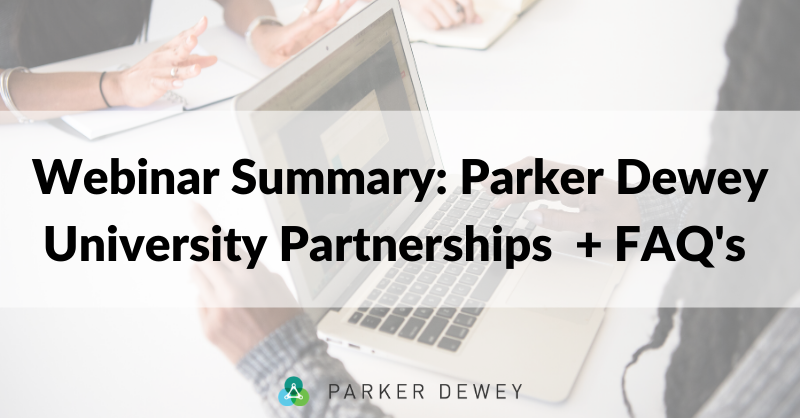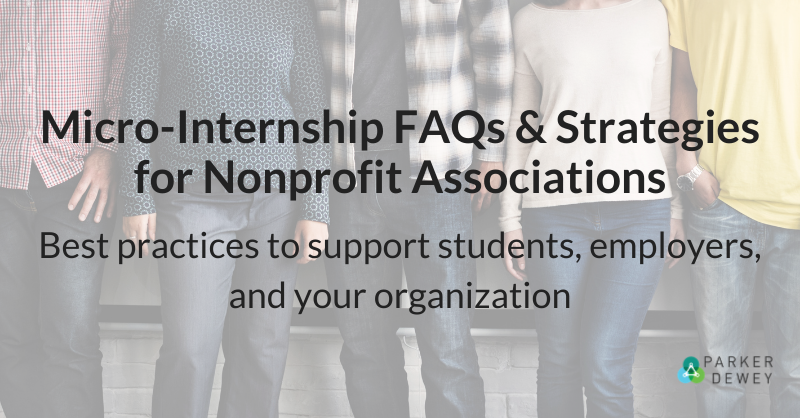
Parker Dewey University Partnerships: FAQ’s and Strategies for Success
Parker Dewey, the pioneer in Micro-Internships, has seen a significant increase in demand from universities interested in learning more about partnership. In response to this, a webinar was hosted to address common questions about Micro-Internships and strategies for a successful program.
The session was led by Kristin Schrader, Director of Partnerships at Parker Dewey, who has extensive experience in Career Services at multiple institutions and leads the team in supporting Parker Dewey’s growing number of university partners. Here is a link to the presentation recording and the slides (PDF). Additionally, some of the FAQ’s that were addressed in the presentation are available below.
For schools looking to launch or enhance their Micro-Internship program, here are some strategies based upon the best practices developed over the past five years.
Engage Your Employer Partners
This is a unique situation, and university recruiters are just as concerned. Not only do they want to support your students, they are looking for opportunities to enhance their employer brand and prepare for future recruiting needs. Some specific strategies that address these goals and support your students include:
- Email to inform them about Micro-Internships and how they help employers connect with students during this challenging time. Here are some sample emails (.docx) to help you get started.
- Develop a featured employer program such as the program featured on slide 31 of the webinar slide deck (PDF) for Purdue University College of Liberal Arts. Outreach for this program has included direct messaging to key employer partners, alumni board members, and other Career Services offices across Purdue’s campus. This effort is a useful method for engaging employer partners and could even be tied into an employer sponsorship campaign.
- Offer resources for assistance in taking their program remote. Employers may be concerned about how to implement a virtual internship plan, but resources like this from University of Wisconsin’s Matthew Hora showcase the benefits of these opportunities.
Parker Dewey’s employer sponsorship program allows universities a revenue-generating opportunity where an employer sponsorship of any value can be split between a university and Micro-Internships for that university’s students. Here is additional information about that program (PDF). This program offers university Employer Engagement teams a unique opportunity to engage employers year-round and a branding opportunity for employer sponsors interesting in a new way to get in front of students.
Activate Your Alumni and other “Friends” of Your University
They want to give back and are looking for ways to do so. Micro-Internships can be an option to provide direct support for your students. Here are some ideas to get started:
- Send Emails to Alumni and Other “Friends” (.docx) about how Micro-Internships can help students now. Alumni who are eager to give back can do so by posting a Micro-Internship for students at their alma mater.
- Develop a featured projects page. Colby College developed a large campaign to promote the posting of Micro-Internships to alumni and parents in order to support the Class of 2020. The page that has been developed for this program features eight pre-scoped projects identified by Colby as being a good fit for their Liberal Arts students and can be posted with just a few clicks.
Inform Your Students
Students are looking for options, and Micro-Internships can provide a way for students to gain professional experience and connect with employers. Here are some strategies that may be helpful:
- Market the platform as a career exploration/development resource via the institution’s various communication channels. Here are some examples and resources:
- Email your students with specific advice and tips such as this video overview and tips from previous Micro-Interns. These emails (.docx) can help you get started.
- Website examples from University of Chicago, Columbia College of Chicago
- Engage university leaders to promote Micro-Internships (e.g. University of Chicago’s College Dean in message to students)
- Provide coaching on applications. Encourage students to apply to projects that are a good fit for their experiences and to completely answer the short answer questions in the application.
- Record success stories to share with students and keep them engaged.
Universities who are interested in a free university partnership with Parker Dewey can get started by completing this form where schools can request a custom landing page. Some of the benefits of universities partnering with Parker Dewey include:
- A custom landing page with university branding
- Marketing materials,
- Notification when projects are posted for your students/alumni, and
- Data access about student/alumni/employer utilization of the platform.
A basic landing page can typically be created within a day of receiving the images required for the page. More customized pages like the ones for Colby or Purdue (mentioned above) can generally be created within a couple of days.
Now is the time for creative and proactive options to help support students. While Micro-Internships can certainly support students, they are also a unique way to engage employer partners who want to connect with students as well as alumni and others who want to give back. More than ever, the higher education community needs to pull together, and Micro-Internships can certainly be one of a variety of options to help students weather the challenging months ahead.
Please let us know how we can be helpful.
Here are some frequently asked questions discussed during the webinar:
What is Parker Dewey?
Parker Dewey is a mission-driven organization committed to helping bridge the gap between college to career through Micro-Internships. The company is based in Chicago, IL and developed the Micro-Internship concept five years ago. It has connected thousands of students to short-term, project-based opportunities across the country.
What is a Micro-Internship?
These projects are generally 20-40 hours in length, paid, professional experiences that are appropriate for current college students or recent graduates. A great way to think about these are the “We should…” projects that employers don’t have time for, or those “I shouldn’t…” tasks that aren’t the best use of time for an organization. If helpful, here are some of the most common Micro-Internships.
Is there a cost to students to use the platform?
The platform is always free for students/grads, and students/alumni are welcome to join the platform whether or not their university is an official partner.
How does the platform work for students?
Students are able to create an account on the Parker Dewey website in a matter of minutes. They can upload information about their experiences, education, a resume/CV, work samples, and other documents if they wish. Once they have completed their profile, they have access to all opportunities currently available on the site.
Parker Dewey’s platform does not integrate with any university IT system or career services platforms such as Handshake or Symplicity. This is so that the platform remains available to all students who are interested in pursuing these opportunities, and students retain full control over the data that they have in the site.
How does the platform work for companies?
Companies can quickly create a profile about their organization and post projects. If they choose to post a project from our project library, projects can be pre-populated and posted in a matter of minutes. Employers only see those students who apply to their projects and can select one or more students for each project. Students work independently on each project and are paid the full amount that is listed in the platform.
All projects are paid on average $15-20/hour, and each project is individually vetted by the Parker Dewey to make sure that it is appropriate for college students/recent grads and compensated fairly. Companies are invoiced by project and are not required to post a minimum number of projects. Opportunities are posted for free, and 90% of what the companies pays goes directly to the student. Students become independent contractors of Parker Dewey who manages the administrative burden of the Micro-Internship including legal, payroll, and onboarding.
In addition to offering a flexible staffing solution with no conversion fees or long-term contracts, these projects also offer employers access to students who currently have difficulty engaging in traditional internships. These may include student athletes or non-traditional students who may be unable to complete a summer internship.
Are all opportunities available to all students? Or can some projects only be visible to students from my university?
Although most Micro-Internships are visible to all students, as of March 2021, organizations/alumni have the option to "feature" their project so that it is visible only to students from specific school(s) and/or affiliations. This change was made to offer universities and nonprofits additional opportunities to engage their alumni and employer networks in support of their students and to generate more opportunities for students/grads still struggling from the pandemic.
"Affiliations" are the non-profit organizations with whom Parker Dewey has partnered who are helping students from underrepresented backgrounds with college and post-college success. Examples of these organizations include Dell Scholars, TheDream.US, Winning Edge, and United Negro College Fund.
Has there been a slowdown in the number of Micro-Internships during this COVID-19 period? Do you anticipate any slowdowns moving forward?
Actually, we’re seeing just the opposite, particularly since employers are looking for opportunities that can be done remotely and flexibly. They still have work to be done and are still interested in connecting with students, so it is very busy in the world of Micro-Internships!
What kind of support does a student receive if selected for an opportunity?
They will receive the contact information for a representative from the company hosting the project as well as from Parker Dewey’s Client Success team. Students also receive a number of onboarding emails as well as resources from Parker Dewey. They are encouraged to reach out to faculty and alumni, and this frequently provides a wonderful opportunity for students and faculty/alumni to connect.
Students also get feedback upon completion of the project, but, no, it is not as in depth as the 10-week traditional internship. Most Micro-Internships can be completed in a couple of weeks if not faster.
Do Micro-Internships ever lead to longer-term opportunities (longer internships, full-time jobs)?
Yes! Micro-Internships often result in offers for internships and full-time jobs, and are even used as a recruitment tool for those opportunities. Employers who have used Micro-Internships recognize that although the project may be short-term, the projects can be a great way to identify students’ potential and evaluate skills like grit, communication, and problem solving that are so important, but often difficult to assess during a traditional recruiting process. Plus, if multiple projects need to be done, these opportunities allow multiple students a chance to work on the different projects allowing for a wider pool of potential interns/candidates for other positions.
Can Micro-Internships be completed by International Students?
Micro-Internships have been approved for international students, often through OPT or a work visa. However, it is up to each school to approve the student, and we direct the students to reach out to their International Students Office before applying.
Why not post these opportunities on Handshake, Symplicity or other career services platforms?
While these platforms can certainly be a great resource for those employers who still have opportunities available that need to be filled (full-time, internship, etc.), Parker Dewey is the only platform specifically designed for short-term, paid, and professional projects for students and recent graduates. Plus, many employers are not willing to engage students for short-term projects like a Micro-Internship due to the administrative burden that this requires, which Parker Dewey alleviates. Students completing projects become independent contractors of Parker Dewey who assumes the administrative burden and guarantees the company’s satisfaction. Click here to read more about this.
Are there testimonials or student experiences of those who completed Parker Dewey Micro-Internships?
Yes. There are a number in our news section and on the blog. Here are a few examples:
- Ohio State University student
- Connecticut College 2020 grad
- Boston University student
- Roosevelt University student
- Texas A&M Dell Scholar
- Student-Athlete from Yale
Additional FAQ’s about Parker Dewey are available here.





